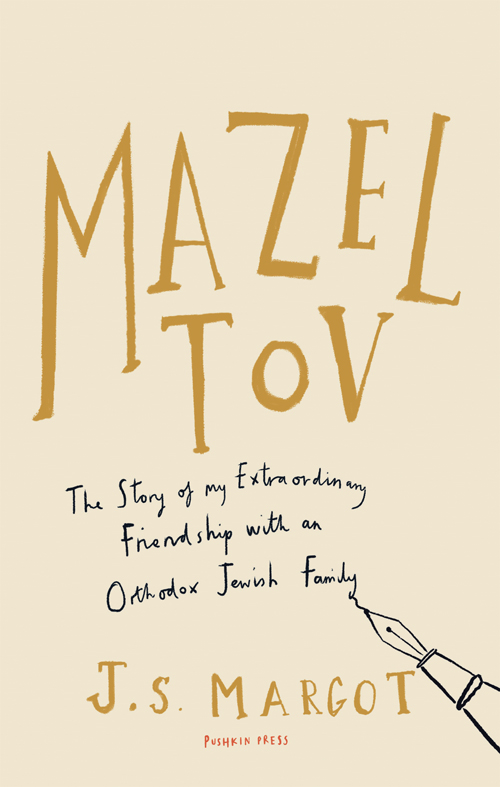“Do you know what ‘l’chaim’ means in Ivrit, modern Hebrew?”
“I think so.”
“Life. ‘L’chaim’ means ‘to life’.”
“I know…”
“Do you also know why Jews say ‘l’chaim’ when they raise their glasses and make a toast?”
“Er…”
Masel Tov author JS Margot reflects on a linguistic detail that reveals the troubled history and repeated persecution of the Jewish people
“Do you know what ‘l’chaim’ means in Ivrit, modern Hebrew?”
“I think so.”
“Life. ‘L’chaim’ means ‘to life’.”
“I know…”
“Do you also know why Jews say ‘l’chaim’ when they raise their glasses and make a toast?”
“Er…”
“Germans say ‘Zum Wohl’, meaning ‘to your health’. The French say ‘Santé’, the Dutch ‘Proost’ and Scandinavians ‘Skål’. Nearly everyone drinks to good health. But not us.”
“No.”
“We drink to life. Do you know why that is?” he asked.
“Tell me.”
“We Jews have been persecuted throughout the ages. So we know all too well that our lives can be over quicker than our good health.”
The conversation had been with Samuel, a liberal Jewish acquaintance of mine, a regular customer at an antiquarian bookshop in town. Samuel likes the same books and the same authors as me. He also likes my book Mazel Tov, and so by extension he likes me.
His remark about “l’chaim” stayed with me. How had I never known this before? Why had none of the Schneiders told me?
For six years in the 1990s I was tutor to the Schneider children. Raised a Catholic, I lost my faith as a teenager and have been a staunch atheist ever since. When it came to religion, I had nothing in common with the Schneiders, an Orthodox Jewish family. In other respects, though, we turned out to have more in common than we initially thought, even if it took us six years or more to discover.
What happened in World War 2 still remains in the DNA of our cities. Whether you like it or not.
The tutoring was done at the Schneider home. A home where the doors – to both rooms and hearts – kept opening a little wider for me. Sometimes only to slam shut in my face. Especially if they revealed glimpses of my private life. Or if it concerned the state of Israel.
The Schneiders lived in Antwerp. But Aaron and Muriel Schneider and their four children could just as well have lived in London, Manchester or Paris. They have been marked by the Holocaust, by the axe taken to the family tree of every Jewish family in Europe. What happened in World War 2 still remains in the DNA of our cities. Whether you like it or not.
When I started tutoring the Schneider children at the age of 21, I knew nothing about Judaism. Like so many non-Jewish citizens of Antwerp, I’d had no contact at all with members of the Orthodox Jewish community, even though we lived less than half a mile apart. There, men with beards, big fur hats and curling side-locks characterised the street scene. As did women with chestnut-brown pageboy hairstyles, dark ankle-length skirts and flat shoes. And the hordes of children who took over the pavement, slaloming around you recklessly on scooters and bikes.
The Schneiders observed the rules of the Torah and the Talmud. Not a week went by without me encountering yet another curious tradition and the umpteenth religious law.
It soon became clear to me why Jews lived together in a neighbourhood, a shtetl. It all has to do with Shabbat, the day of rest. And the things you’re not allowed to do on it. You’re not allowed to drive or cycle. You’re not allowed to use a lift, unless a goy – a non-Jew – presses the button for you: pious Jews mustn’t activate or deactivate an electric circuit. On Shabbat – from Friday to Saturday evening – you’re only allowed to go a certain number of steps. So synagogues have to be nearby. Otherwise you can’t get to your house of prayer, which you have a sacred duty to attend.
I got to know the Schneider parents and the children. When the children grew up, I visited them in Israel, and later in New York and Amsterdam. I was indignant at their introduced marriages. But found myself charmed by their partners.
I also became acquainted with Mrs Pappenheim, the only grandmother in the Schneider family – the only grandparent to have survived the Holocaust. Tiny as she was, I looked up to her. She didn’t talk very much. Least of all about the Holocaust. The very little she did say about it is recorded in Mazel tov. And in my heart.
Which is where that “l’chaim” toast comes in again. And that seemingly trivial conversation in the antiquarian bookshop.
To life.
The Holocaust and its reign of death was a subject never touched on by the Schneiders. But from their silence I sensed the unspoken sorrow they carried within them.

“There are two kinds of sorrow,” Mr Schneider had said. “One that can bear being prodded. And one so great that you have to keep your distance from it.”
Yet I have never known a family who so celebrated daily life as the Schneiders. Life is the driving force. L’chaim. And mazel tov!
Mazel Tov by JS Margot is out now (Pushkin, £12.99). Margot will be interviewed about her book Mazel Tov on March 8 during the Jewish Book Week Festival. Info and tickets: jewishbookweek.com
HELP VENDORS KEEP WORKING THROUGH THE COLD
For £36.99, help a vendor stay warm, earn an extra £520, and build a better future.







